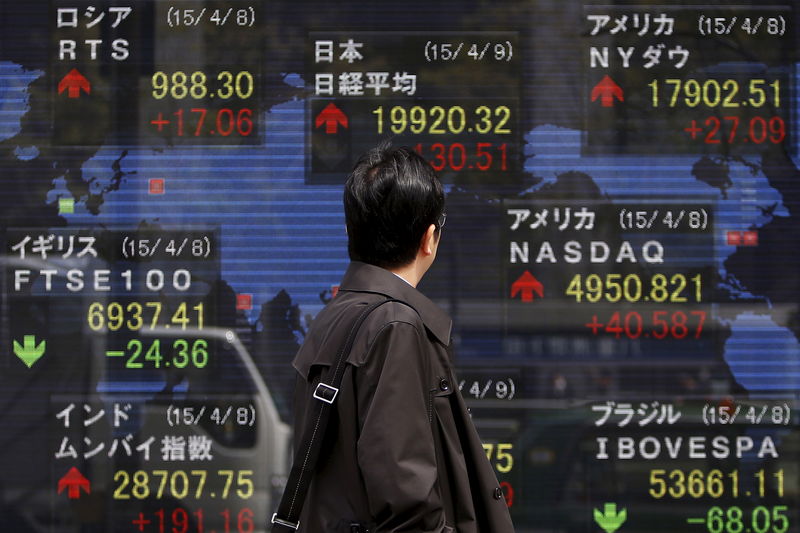This post was originally published on this site
https://i-invdn-com.akamaized.net/news/LYNXMPEB380HB_M.jpg
Investing.com – Asia Pacific stocks were mostly up on Thursday morning, with investors digesting weak U.S. economic data and an uptick in COVID-19 assets. Stocks took a breather from the massive rally that saw the Dow Jones Industrial Average rise above 30,000 for the first time and all-time highs for global equities.
Japan’s Nikkei 225 rose 0.47% by 11:13 PM ET (3:13 AM GMT).
South Korea’s KOSPI gained 0.29%, with the Bank of Korea keeping its key interest rate unchanged at 0.50, as expected. The country is battling a surge of COVID-19 cases, with 583 daily cases reported as of Thursday.
In Australia, the ASX 200 was down 0.36%.
Hong Kong’s Hang Seng Index was up 0.21%. Chief Executive Carrie Lam’s policy address, her longest so far, failed to impress over the lack of eye-catching measures.
China’s Shanghai Composite inched up 0.06% while the Shenzhen Component slid 1.10%.
Data released on Wednesday showed that the U.S.’s GDP grew 33.1% quarter-on-quarter during the third quarter, missing the 33.2% growth in forecasts prepared by Investing.com by a sliver. Growth remained unchanged from the second quarter, however.
The same data also showed 778,000 jobless claims for the past week, higher than the forecast 730,000 claims and the 748,000 claims submitted during the previous week.
Some investors suggested that this was a much-needed, short-term correction.
“In the very short-term, there’s a strong argument that we’re due for a pullback in risk assets: market internals are looking overstretched, the technicals suggest slightly overbought conditions and expectations of some pretty heavy end of month portfolio rebalancing looks likely to curtail upside momentum in stocks,” IG Australia markets analyst Kyle Rodda told Reuters.
Meanwhile, the minutes from the Federal Reserve’s latest Federal Open Market Committee meeting did not foresee any immediate adjustments to current policy. However, the minutes did indicate discussion during the Nov. 4-5 meeting about providing more guidance on its bond-buying strategy “fairly soon”.
Progress towards a COVID-19 vaccine and a peaceful transition to the incoming President Joe Biden’s administration in the U.S. continue to boost investor sentiment for the long term, however.
“We believe the market rally can continue from here powered by all the positive vaccine news, more political clarity with a peaceful White House transition and with more stimulus to come … we are already seeing a strong rotation into cyclical and reopening trades with the vaccine news and we expect this trend to continue,” UBS Global Wealth Management managing director Xi Qiao told Bloomberg.
“Sentiment overall remains very bullish … the hope for a return to normal economic activity in 2021 is giving the markets all it needs to continue take on risk, with only a completely unforeseen event likely to kill that trend from here,” IG Australia ‘s Rodda added.
However, other investors were more cautious.
“I think a lot of people got ahead of themselves imagining that the recovery was taking shape. To me the recovery isn’t taking shape until we have a viable vaccine,” Cantor Fitzgerald Treasury analyst and trader Justin Lederer told Reuters.
On the COVID-19 front, the number of global COVID-19 cases surpassed 60 million as of Nov. 26, with over 12.7 million cases in the U.S. alone, according to Johns Hopkins University data.

